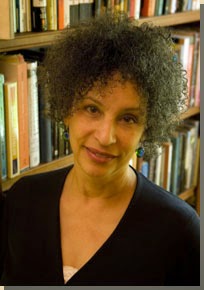- Public Policy
- Leadership
- Funding
- News & Events
- About the Center
Back to Top Nav
Back to Top Nav
Back to Top Nav
Back to Top Nav
This year marks the 50th anniversary of the historic march from Montgomery to Selma, Alabama. For this year’s celebration of this momentous event, the Rockefeller Center explored Dartmouth’s connections to the Civil Rights Movement by hosting a faculty panel. After their talk, "We Were There…Dartmouth and the Civil Rights Movement," Courtney Wong '15 sat down with Gretchen Gerzina, a speaker on the panel, for an interview. This is the second interview in a series with each of the panelists.
The Kathe Tappe Vernon Professor in Biography, Professor of English, and Chair of African American Studies at Dartmouth College, Gretchen Gerzina is the author or editor of seven books and was for 15 years the host of the nationally syndicated public radio program "The Book Show." An Ann Arbor, Michigan native, Gerzina recently wrote a novel entitled "Mr. and Mrs. Prince: How an Extraordinary Eighteenth-Century Family Moved Out of Slavery and into Legend."
 |
| Professor Gretchen Gerzina |
Courtney Wong (CW): In your presentation, you spoke about your upbringing in an "integrated" neighborhood. At what age did you really get a grasp on the external racial issues that extended beyond your neighborhood?
Gretchen Gerzina (GG): I can remember a moment in kindergarten when I realized that people found it different that I had a white parent and a black parent. Also, the church that we belonged to was predominantly a middle-class black church, and I can also remember it being very political. But I always had white friends and black friends, and white neighbors and black neighbors, and I don’t really remember it being a big deal. I always thought my unique ethnicity was a cool thing, and I still do.
CW: Did your parents feel obligated to educate you about the broader Civil Rights Movement?
GG: I don't really know if they felt that it was their job to educate us, my siblings and I. Of course, the television and radio were on and around us all the time, so they wanted us to know what was going on but they also wanted us to feel comfortable about who we were. My parents wanted us to have happy lives.
CW: How can the novel be a gateway into essential parts of history that we can’t necessarily learn from a textbook?
GG: Take Jane Austen, for example. Her stories took place in such a small setting, but you can learn so much about the era. You learn about the manners of the people and how people interacted with each other in a very different way than today, but then someone very different like Toni Morrison in Beloved teaches you so much about the psychology of slavery. So many people have written about the narratives, but no one has gotten into the mind of how it feels like she does. It's important to know how we lived and how we got to the way we are today, and fiction can really do that. I feel that when I teach history, I can't say much more than what I can prove, but with fiction I have free reign, which is why I want to try it someday.
CW: How does your background influence the way that you teach African American history and literature?
GG: I bring a lot of personal stories in – not necessarily about my own life, but also from people that I know. I want students to have context for the things that we're reading about. You find yourself repeating things that you've already taught, but for me it's been really important for them to know what life was like for a lot of people during the Civil Rights Movement era. It's important to know what it was like to grow up in those times, and not just how it was for me, but also how it was like for people before me. Students have to know that people put down their lives for what we have today, and how people died for the right to vote.
CW: What draws you to certain genres of literature?
GG: I teach fiction but write biographies. It's interesting because I would love to write fiction someday, but I keep thinking that I haven't exhausted the real stories yet. However, I just love the way that fiction is put together, and the way it can move you and push you in a direction that you may not necessarily want to go. When it works for the students, it's just wonderful.
CW: What is one of your most enjoyable classes to teach?
GG: I think I love the "Victorians Through Six Children’s Novels." The students come in thinking that it's going to be easy because it's about children's novels, but it's really about the Victorians. We use the children's books to learn a lot about an era. I also like it because students have very different perspectives on childhood compared to what actually existed in the past.